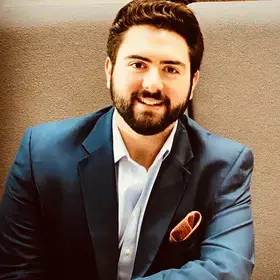What’s the career path for a person who earns a master’s in Negotiation and Conflict Resolution? Alumna Sofia Rinvil advises, “there are many paths,” although she has established her career “mainly in the business and legal sectors… working on contracts, negotiations, [and] deals.”
The 2018 Columbia NECR graduate says that she is constantly learning to provide comprehensive solutions to complex business challenges. Rinvil has brokered partnerships between microenterprises, elite law firms, and community organizations at a nonprofit that provides pro bono civil legal services in New York City. She was recently elected as the 2021-2023 Programming Officer for Columbia's Black Alumni Council and participates in the e-Mentor Program, supported by the Career Design Lab and Office of Alumni Relations, to provide career guidance to current graduate students. She shared the most rewarding parts of mentoring as well as how her Columbia master’s degree shapes her own career.
What kind of impact are you trying to make through your career?
My current interests lie in the particular experience needed to navigate the evolving fields of entrepreneurship and community development. Since 2018, I have served as the Chief Executive Officer of my own company. I am also a Global Goals Ambassador for the United Nations Association of the United States of America (UNA-USA). In this role, I work to enhance the Global Partnership for Sustainable Development Data by negotiating multi-stakeholder partnerships that mobilize and share knowledge, expertise, technologies, and financial resources to support the achievement of Sustainable Development Goals in all countries, particularly developing countries. In my previous service role at a nonprofit pro bono civil legal services provider in New York City, I helped to expand and fortify the project's network of community and corporate partnerships, and bring pro bono legal services to the city’s most vulnerable small business owners and entrepreneurs.
I am passionate about helping those in need formulate a broad strategy to protect legal rights or bring about social change. I enjoy examining and discovering the facts, researching the law, and supporting the desired position or outcome. I love this advocacy and it is the reason I dedicate my work and intellectual pursuits to causes that support business, civil, and human rights. Having the ability to make a tangible difference in someone's life is incredibly satisfying.
What compelled you to sign up as an e-Mentor at SPS?
I am a huge advocate of giving back through service so it was a no-brainer to give back to SPS as the NECR program has given to me. I had several mentors throughout the program and I wanted to invest in individuals who would also use their education to make a difference. I had the opportunity to mentor a NECR student and other students in another program.
What was the most rewarding part of the e-Mentorship?
The most rewarding part of mentorship is watching mentees successfully navigate their courses, their work, personal lives, and their ability to still find time to invest in themselves to see how they can improve. I love to see the mentee's growth and accomplishments.
What advice would you give to Negotiation & Conflict Resolution students who are seeking to translate the skills they're developing in the job search?
Always keep an open mind, do your own research, keep your resume current, network, and negotiate your worth. Most importantly, be self-aware, do not fear advocating for yourself or rejections, and keep trying new things. You will start out pursuing a particular path, but learning about new opportunities may cause you to change your direction, and you must know how to navigate through it all. Know that you will constantly be negotiating and problem-solving no matter which industry you work in.
How has earning an M.S. in Negotiation & Conflict Resolution from Columbia enhanced your career?
Honestly, the investment in the NECR program from Columbia has been phenomenal for my career. It has provided me with a new set of soft and hard skills and helped me to improve my negotiation and problem-solving skills. The program has helped me to gain skills, become more self-aware, and be a better advocate throughout my career. The training from this program has also allowed me to think quickly and provide a solution when I am in front of clients, savvy business leaders, legal professionals, and government officials.
What does it mean to you to be a member of the Columbia SPS community, especially at this time?
It means taking time to be there for someone else, especially in a world of uncertainty—to care about someone else shows the character of individuals within the Columbia community; there are people here who are always willing to offer support.
The Spring 2022 e-Mentor Program will run from January 31st through April 29th. Learn more about the program, including how to sign up a mentor or mentee.


